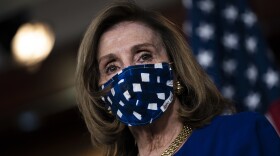Philip Ewing
Philip Ewing is an election security editor with NPR's Washington Desk. He helps oversee coverage of election security, voting, disinformation, active measures and other issues. Ewing joined the Washington Desk from his previous role as NPR's national security editor, in which he helped direct coverage of the military, intelligence community, counterterrorism, veterans and more. He came to NPR in 2015 from Politico, where he was a Pentagon correspondent and defense editor. Previously, he served as managing editor of Military.com, and before that he covered the U.S. Navy for the Military Times newspapers.
-
Democrats sought to make a point about their desire to provide more money for Americans than congressional Republicans — picking up an attack line from none other than President Trump.
-
The Senate minority can't stop Amy Coney Barrett from ascending to the Supreme Court, so it did as much as possible to tar her in the eyes of the public as an extremist rubber stamp for Trump.
-
Republicans are enjoying a grand slam in Supreme Court nominee Amy Coney Barrett and a victory already won thanks to their majority. They argue she is tailor-made for a lifetime post.
-
The Idaho senator sought to puncture what he called Democrats' caricature of Amy Coney Barrett as someone who, despite her claims, would bring an activist mindset to the Supreme Court.
-
Amy Coney Barrett said she would "keep an open mind" on the question about whether to admit TV cameras to the now-closed Supreme Court.
-
The Supreme Court nominee discussed voting laws, rights and practices with her Democratic questioners on her third day of confirmation hearings before the Senate Judiciary Committee.
-
The Supreme Court nominee declines to opine on whether President Trump can pardon himself, citing the possibility she might need to rule on it. Sen. Cory Booker agrees it's a bridge she could cross.
-
President Trump suggested the 2020 election could wind up as a case before the Supreme Court, but his nominee said Tuesday she does not view herself as his justice and would treat the matter fairly.
-
When majority Republicans don't need to make a case to sell their candidate, they're free to ask her broader, gentler and, sometimes, random questions.
-
The Supreme Court nominee didn't say she would recuse and didn't say she wouldn't in the event a Trump election case came before the high court, but she agreed to evaluate the matter on its merits.










